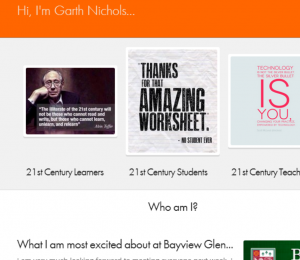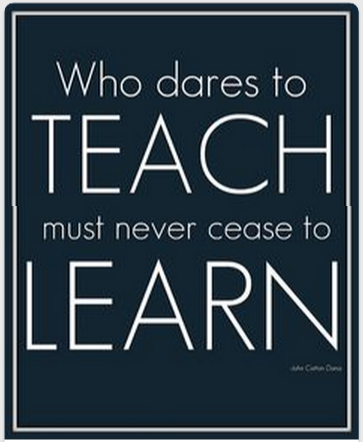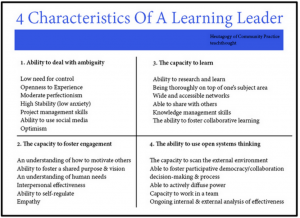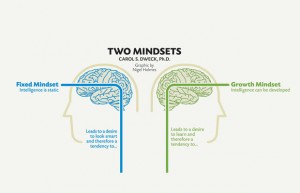I’ve been doing a lot of thinking, reading and exploring about educational leadership over the summer in preparation for my new role as Director of Teaching and Learning. There are some things that I really want to make sure I make habits of mind. The first is to be a Learning Leader.
For me, these characteristics are important not only for me, but also for the teachers that I am leading in my new role. I particularly would like to effectively model my comfort with ambiguity – that the answer is rarely crystal clear, that the answer to the same question can vary over the year, depending on the context and circumstances.
I also really like the characteristic of using open systems of thinking. That is, being transparent. I’ve written about this in my last blog post, but it bears repeating: that leaders need to be open with their ideas, systems, vision and operationalization of these. This will foster, at bare minimum, a conversation. It will, ideally, build positive capacity behind these initiatives.
The other thing that I think is vital to a Learning Leader is to cultivate in themselves, and foster in others, a Growth Mindset. Carol Dweck has written extensively on this topic; however, what I would like to do is to take it one step further and deepen this element of the Learning Leader. By connecting Growth Mindset to, what Angela Lee Duckworth, refers to as “Grit”, I think that the Learning Leader can experience set backs, as we all do, but then they can model, articulate and behave in a way that make concrete these positive behaviours.
So, when a Learning Leader experiences a set back, or a crisis, they can take action from Murray Newlands article “5 Things that Leaders do in a Crisis“. They can:
1) Make sure to not let their emotions get in the way…
Don’t be distant, and don’t pretend not to care; rather, try to approach the challenge, failure, crisis from a the perspective of a scientist: focus on what went wrong, ask questions, formulate hypothesis.
2) Be Brave:
Don’t let stress turn to fear. Embrace stress because in small amounts, stress can be good for you. Use that added energy to reaffirm what you and your team have been doing. Take perspective on the failure and revisit your mission statement and how you are making progress to achieve it.
3) Be accountable for your successes and failures
Own up to mistakes, take responsibility, because that is what you would want of your teachers and students and colleagues. Defining your failures and owning them in front of others is an opportunity to clarify your way forward, i.e. how you will move forward from this setback. Conversely, when you succeed, understand that it was not all your doing – that you rely on your team, and they are the ones that operationalize your ideas…
4) Don’t take failures personally
As Angela Lee Duckworth talks about, Grit allows a leader to sustain interest and engagement in long term projects. It is hard to not become attached to these projects, but don’t live your projects and work to the point where if they fail, or they don’t take flight like you want them to, that you believe it is a reflection on your own leadership. It’s about the students, after all, and as a Learning Leader, you need to have that as your primary focus, not your own ability to make things happen.
5) Be positive, from start to finish (Newland put this too well to try to paraphrase)
The end of the crisis is not just when you pull yourself out of the muck that it had put you in. The end of the crisis is when the team has started to recover and is moving on, which might take a bit. Keeping a positive attitude on your face and pushing the excellence of your team will keep morale high, which will put things right back on track in no time at all, and will also earn you the trust and respect of your employees.
Read more: http://www.inc.com/murray-newlands/5-things-successful-leaders-do-in-a-crisis.html#ixzz3BGMI2AYC
As I begin my new journey as a Learning Leader, I’ve started by trying to make myself as transparent as possible. That is the characteristic that I’ve decided to focus on and begin with. I know I have the others in some capacity that I am ready to grow, but I am also trying to prioritize my energy and resources!
To this end, I have sent my new teachers and colleagues a “Get to know me, and Getting to Know you” message via Smore: Check it out HERE

What are characteristics that you have, that you will grow, or that you recognize in others? What, to you, is a Learning Leader?



Good luck with you new position, Garth! I love the “learning leader” phrase and I think that it is such a great way to communicate to others how you see yourself.
BVG is lucky to have you! We’ll miss you at GCS but looking forward to the ball game in a few days to catch up! Great food for thought re. Leandership here, especially for myself and the others who are new to this. Many ideas to take away and, as always, your leadership is most appreciated!
Loved reading this post, Garth. BVG is lucky to have you on their team this year. I hope that all admin can see / learn from some these inspirations ideas.
I was interested in the idea of not letting your emotions “get in the way”. Maybe it’s just me, but teaching and working in schools can be a tremendously emotional experience. Trying to push emotions out of the way, I think, suggests that they are pesky nuisances that just distract. I wonder if it is more wise to sit with what comes up in challenging situations (“Oh…I am really feeling embarrassed / angry / frustrated / tired right now”) and allowing these emotions to teach us something.
The best school leaders I have seen have also been transparent when strong emotions come up and don’t try to pretend like they are not part of their practice.
Just a thought!
Congratulations Garth on this new (ish) role. Looking forward to some great conversations in July at Project 2051!